新人教版八年级英语下册unit3教案
(完整版)英语人教版八年级下册Unit3教学设计

(完整版)英语人教版八年级下册Unit3教学设计课题:Unit 3 Could you please clean your room?Period 1 (Section A 1a-1c)学习目标【Learning objectives】1.掌握单词: rubbish, fold, sweep, floor, take out the rubbish.2.学会礼貌地提出请求并熟练练习对话。
重点和难点【Important and difficult points】教学重点:能熟练拼读单词及短语rubbish, fold, sweep, floor, take out the rubbish.教学难点:学会用句型“Could you please…”来礼貌地提出请求。
预习内容【prepare lessons before class】1.要求学生掌握单词rubbish, fold, sweep, floor, take out the rubbish并指导学生找出家务活的表达方式。
2. 指导学生用“Could you please…”造句。
学习过程【Learning process】一、预习反馈,明确目标【Preview feedback, Clear objective】1.本节课的单词你有更多的是积累吗?2.写出更多家务琐事的表达方式:3.你知道怎样礼貌地提出请求吗?二、创设情境,自主探究【Create situations, Self inquiry】1. T: 1) Do you help to do any chores at home ?2) What work do you usually do to help your parents?3) Which one are you good at?Ss: Discuss the teacher’s questions with their partners.2. Check(√) the chores you can do in 1a and add more chores.三、展示交流,点拨提升【Display communication, Coaching to enhance】1. T: 1. Who are the two people in the picture? Why do yousay so?2. Where are they? How do you know?2. Read the chores and add more chores.3. Use “Could you please…” to make a conversation just like Peter and his mother. 1c.4. Listen to 1b and check their answers.四、师生互动,拓展延伸【Teacher-student interaction, Development】【归纳】Make polite requests. ------ Could you please…? Yes, sure./ OK, but……【拓展】1.Can you do some dishes?2. rubbish的同义词:eg. You do talk rubbish sometimes. 胡言乱语【辨析】1. do 与make2. clean 与sweepeg. Let’s clean the house. You sweep the floor and I wash the dishes.五、达标测评, 巩固提高【Evaluation standards,Consolidation and improvement】基础题I. 根据句意及首字母提示写出单词。
英语:Unit 3教案(人教新目标八年级下)
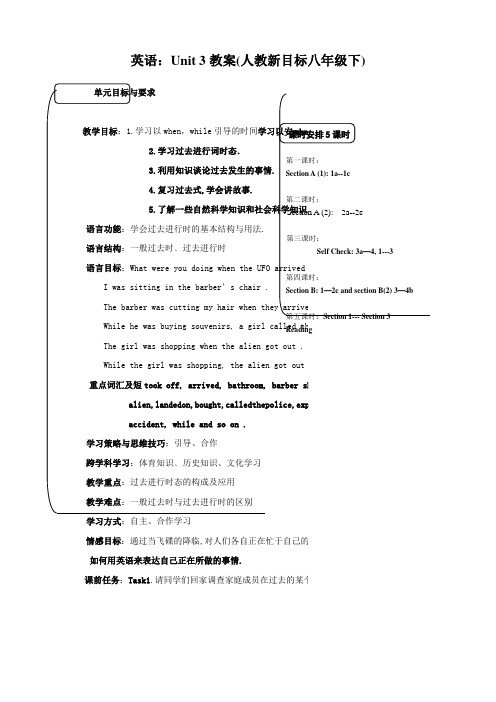
英语:Unit 3教案(人教新目标八年级下)学习方式:自主、合作学习情感目标:通过当飞碟的降临,对人们各自正在忙于自己的事如何用英语来表达自己正在所做的事情.课前任务:Task1.请同学们回家调查家庭成员在过去的某个时第一课时教学内容与分析教学内容:Section A (1): 1a---1c教学目标:1.能够掌握基本单词和词汇。
2.学会过去进行时的基本结构与用法。
3.能够运用以when 引导的时间状语从句。
4.能够运用基本句型进行提问。
学习任务:我的爱好目的:通过学生小组活动,调查在过去的不同时间里做不同的事情,学会使用过去进行时态,培养学生应用英语进行交际的能力。
语言技能:Listening .Speaking .Reading ﹑Writing语言知识:过去进行时的用法及复习一般过去时态提示词语及句型:got out, cut, barber shop, bathroom, kitchen, well, bathroomWhat were you doing when the UFO arrived ?I was sitting in the barber’s chair .The barber was cuttingmyhair when they arrived .教学重点、难点分析:教学重点:基本单词,词汇和句型教学难点:能够运用过去进行时谈论人们所做的事情.课前准备1.本课时的教学课件2.课前发给学生表格向学生布置任务:在表格中写出有关内容。
教学设计教学步骤建议和说明Teaching Steps :Step 1 :Warm-up and revision1.Share an English song .2.Greetings and free-talk .从平常的谈话中轻松导入本课句型,信息沟通使谈话非常真实,而又浅显What are you doing ? What did you do last night ?3.Show slides: Revise: is/an/are +动词ing4.Brain storm:Collect the names of activities which said by the students.Step 2 :Presentation :1.Watch a video2.By asking: What’s this in English ?Have you even seen it ?3.Teach:UFO, bedroom, bathroom, bedroom, kitchen,living-room, barber shopStep 3 :Work on:SB Page 18 , 1a .1.Point to the sentences .Read the sentences .Explain what each one means.2.Teach :barber shop, well, bathroom, bedroom, kitchen, get out, cut3.Look at the picture.. Point out the six people. Match the statements with the people in the picture4.Check the answers .5.Practice reading .Step 4 :Work on:SB Page 18 , 1b .1. Read the instructions .Make sure the Ss understand whatthey should do .2. Look at the dialogue in the picture .Explain :过去进行时态的构成: was / were + doing .用法:表示过去某一时刻或某一段时间正在进行的动作,一般用时间状语来表示。
人教版八年级英语下-unit3-could-you-please-clean-your-room教案
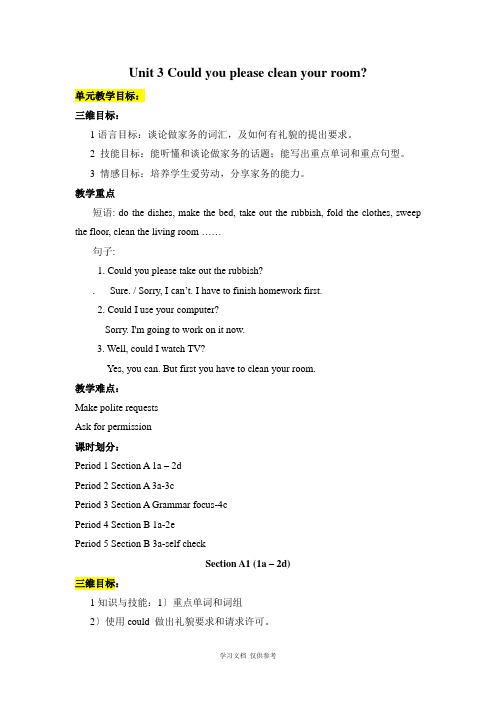
Unit 3 Could you please clean your room?单元教学目标:三维目标:1语言目标:谈论做家务的词汇,及如何有礼貌的提出要求。
2 技能目标:能听懂和谈论做家务的话题;能写出重点单词和重点句型。
3 情感目标:培养学生爱劳动,分享家务的能力。
教学重点短语: do the dishes, make the bed, take out the rubbish, fold the clothes, sweep the floor, clean the living room ……句子:1. Could you please take out the rubbish?. Sure. / Sorry, I can’t. I have to finish homework first.2. Could I use your computer?Sorry. I'm going to work on it now.3. Well, could I watch TV?Yes, you can. But first you have to clean your room.教学难点:Make polite requestsAsk for permission课时划分:Period 1 Section A 1a – 2dPeriod 2 Section A 3a-3cPeriod 3 Section A Grammar focus-4cPeriod 4 Section B 1a-2ePeriod 5 Section B 3a-self checkSection A1 (1a – 2d)三维目标:1知识与技能:1〕重点单词和词组2〕使用could 做出礼貌要求和请求许可。
2.过程与方法:通过合作探究的方法结局本课的重点知识点3.情感态度与价值:学会照顾自己,培养自己的独立意识。
教学重点:谈论做家务的词汇,情态动词could的使用方法。
Unit 3 Section A (3a -3c)教案人教版英语八年级下册
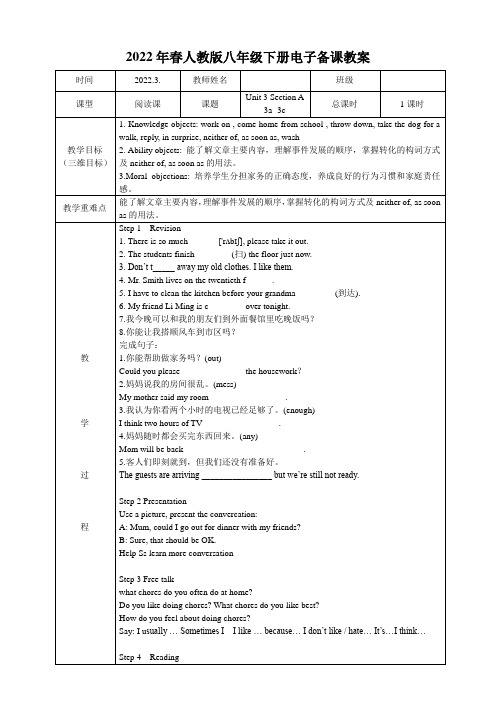
Step 2 Presentation
Use a picture, present the convercation:
A: Mum, could I go out for dinner with my friends?
Read the story and choose the best answer.
( )1. Who wanted a walk?
A.Nancy’s room B. The dog C. Nancy’s dad D. Nancy
( )2. Nancy came home from ________.
B: Sure, that should be OK.
Help Ss learn more conversation
Step 3Free talk
what chores do you often do at home?
Do you like doing chores? What chores do you like best?
D.Because she got back home late.
( )5. How did they solve the problem?
A.Nancy’s mother said sorry to Nancy.
B.Nancy said sorry to her mother and now she understood she should share the housework.
3.我认为你看两个小时的电视已经足够了。(enough)
八年级英语下册 Unit 3 Could you please clean your room?教案

Unit 3 Could you please clean your room?Section B 2a-2e教学设计一、教学目标:1. 语言知识目标:1)复习本单元已学词汇及句型;2) 继续练习怎样礼貌委婉地提出请求或允许;3)通过阅读,学会思考,找到能支持自己观点的理由,形成自己的思维观点,并能够在辩论中清晰表达出来,最终形成书面材料。
2. 能力目标1)学会怎样辩论并简洁明了地表达出自己的观点;2)练习说、读、写技巧;3)能够关于孩子做家务问题对周围人进行采访,并生成书面记录。
3. 情感态度价值观目标:本课时学习内容贴近学生的日常生活,学生可以利用所学内容谈论自身在家做家务情况,通过对于孩子做家务问题的辩论引导学生认识到做家务是每个家庭成员的责任和义务,从而激发其劳动热情,督促其主动帮助父母分担家务,培养其独立意识。
二、学情分析我教的班级学生整体处于中等偏上水平,学生英语基础较好,英语综合能力一般,但学生间英语水平及学习能力差距较大,所以我在教学的过程中尽量设计多种难度水平的活动让大部分学生都参与进来。
八年级下学期是学生提高语言水平及语言整体素质的关键期,学生已经有了一定的词汇量及语言基础,因此老师应尽量设计内容丰富,形式多样的活动来激发学生的学习兴趣及积极性,从而提高学生的语言运用能力及素质。
三、教学重难点1. 教学重点:1)复习本单元所学过的重点短语及句型。
2)完成阅读任务,培养阅读技巧。
3)能够清晰表达自己对做家务一事的看法。
2. 教学难点:1)能够采访周围人对孩子做家务一事的看法,并做书面记录。
2)能够思考并得到找到能支持自己观点的理由,并形成书面材料。
3)通过完成阅读任务提高自己的阅读能力。
四、教学过程I. Warming-up and lead-in1. Greet students as usual and tell students that there is a group competition in which the winner group can get the gift.2.Interview some of the students about whether they do housework at home and what they often do.3. Show the chatting records of parents group about kids doing chores at home to lead in the topic of this class—whether children should do chores at home or not.II. Pre-readingAsk the following two questions:1.What can you know from the chatting records of your parents?2.Do you think kids should do chores at home?III. While-reading1.Students read the two letters quickly to find out which one agrees and which one disagrees and give the reasons.2.Introduce the reading skill “Skimming”—looking quickly through a piece of writing to find the main idea without reading every word. It is still a good idea to read the first sentence in each paragraph quickly.3.Students read the examples already given in 2c and guess the meanings of “pros” and “cons”. Ask students to do a group work-- according to Mr. Smith and Ms. Miller, what are the pros and cons about kids doing chores?4.Students read the letters again and fill in the blanks to review the reasons given by Mr. Smith and Ms. Miller.IV. Post-reading.1. Be a good debater. Ask the students choose one side freely and have a debate onwhether children should do chores at home.2. Ask students to prepare for the debate and give some tips to them. Students can use the information they get before class. Students write down their ideas during their preparation.3. Introduce the rules of debate and the debate begins. Students from the positive side and the negative side can stand up and give ideas. The teacher concludes the debate in the end.V. Emotional sublimationShow some pictures of parents who work hard and remind students of the great contributions parents make to our family. Encourage students to be a good helper at home and try their best to do chores. Give the winner group some housework cards to encourage them to do chores at home.VI. HomeworkWrite a passage to express your ideas about kids doing chores at home.五、板书设计Unit 3 Section B 2a-2ekids doing chores at homeMs. Miller VS. Mr. Smithnegative side positive side。
人教版八年级英语unit3教案

Unit 3 I’m more outgoing than my sister.Period 1 (Section A 1a-2d)Teaching Aims:1. Words:outgoing,better, loudly, quietly, hard-working, competition, fantastic, which, clearly, win, thoughLanguage objects:That’s Tara, isn’t it?Sam has longer hair than Tom .Both Sam and Tom can play the drums, but Sam plays them better than Tom. Tara works as hard as Tina.2. Ability objects:To talk about personal traits and compare people; to improve Ss’ speaking, listening and writing skills.To grasp the structure of comparatives, e.g. comparatives with –(i)er and more, both and as...as...; to grasp the structure: A+谓语+比较级(adj./adv.)+than+B, A+谓语+as+原级(adj./adv.)+as+B.To recycl e vocabulary about description3. Moral objects: To find strengths of somebody else, to explore the beauty of the world.Teaching important and difficult points:1. To talk about personal traits ; to grasp how to compare people.2. To use target language: A+谓语+比较级(adj./adv.)+than+B, A+谓语+as+原级(adj./adv.)+as+B, comparatives with –(i)er and more.3. To improve the students’ listening, speaking and writing skills; to develop their communicative competence.Teaching Procedures:Step 1 Leading-in.To show some pictures to recycle adj. based on some types, and learn some new words.Step 2 1a1. Learn new words:outgoing,better loudly quietly which competition fantastic hard-working clearly win funny friendly smart lazy2 . Look at the picture in 1a and make a list of the adjectives.Purpose: to make the students recall some adjectives they have learned before;3. To make the students compare two persons or two things with the above adjectives and adverbs; to summarize the pattern of comparative degree.“A+谓语+比较级(adj./adv.)+than+B”4. To show the map of Anhui Province to guide the students to compare Fuyang and Wuhu in size, climate, slight spots and so on.Purpose: to practice comparatives; to show the structure of “A+谓语+as+原级(adj./adv.)+as+B” and compl ete emotional aims.Step 4.Listen and write .1b Listen again for the students to listen and fill in the chart.Check the answers with the classStep 3 Practice.1c. Pair work: Compare two persons.Purpose: to make the stud ents practice the patterns of comparative degree. Step 4. Listening1. 2a Listen and change the adjectives into comparatives by -er/-ier/or more.2. 2b Listen again. Match the activities with how often Cheng Tao does them. Step 5. Pair work:2c Fill in the chart first and then make conversations in pairs.Step 6. Role-play the conversations2d Let the students read the chart and find out the differences between Sam and Tom.Explain the comparatives of the adjectives1) smart-smarter2) funny-funnier3) hardworking-more hardworking3.Let the students h ave five minutes for the students to recite the statements.4.Role-play the conversation in pairs.Step 7 To sum up.To make the students summarize what they have learned in this class.Step 8. Homework.1. Preview 2d2. Writing: The person I respect.Blackboard designUnit 3 I’m more outgoin g than my sister.Unit 3 I’m more outgoing t han my sister.Period 2 (Grammar Focus-3c) Teaching Aims:1.Key structure:Is Tom smarter than Sam?Is Tina more outgoing than Tina?Are you as friendly as your sister?Does Tina work as hard as Tara?Who’s more hard-working at school?2. Ability aims:Students can use the Comparison of adjectives to compare different persons. 3. Emotional aims:Everyone may has own opinion, different people have different ideas. Teaching important points:(1)To learn how to add –er/-ier/more … after adjectives/adverbs.(2)To learn : S + be + adj./adv.比较级+than+被比较对象S + have/has +adj./adv.比较级+n.+ than+被比较对象(3)To learn: Who+be+adj. 比较级+…?Teaching difficult points:(1) To learn Which/who sentences.The students can und erstand and write a short passage between two persons. Teaching procedures:Step1 Revision写出下面形容词的比较级形式white young funny red west cloudygreen windy happy blue curly busyyellow straight sorry big tall scarysmall hot w arm short cold strictlong coo c heap terrible fantastic colorfulsuccessful unfriendly t ired surpriseddelicious relaxed international expensive sunnyStep 2 Grammar FocusLet the students read the sentences in the box and make sure they und erstandthem. Pay attention to the use of the foll owing sentences:Is Tom smarter than Sam?Is Tina more outgoing than Tina?Are you as friendly as your sister?Does Tina work as hard as Tara?Who’s more hard-working at school?要点总结形容词在句中常作表语和定语,也可补充说明宾语;副词的句中主要作状语。
人教版八下英语三单元说课稿范文

人教版八下英语三单元说课稿范文英文回答:Unit 3 of the 8th grade English textbook published by People's Education Press focuses on the theme of "Travel Journal". This unit is designed to help students learn how to write a travel journal and express their thoughts and feelings about different places they have visited. The unit covers vocabulary related to travel, grammar structures for describing experiences, and writing skills for creating engaging travel journals.The unit starts with a reading passage about astudent's trip to London. In this passage, the student describes the sights, sounds, and experiences of the tripin detail. This serves as a model for students to follow when writing their own travel journals. The vocabulary and grammar exercises in the unit help students practice using descriptive language and expressing their opinions about different places.One of the key activities in this unit is the writing task where students are asked to write their own travel journal entry about a trip they have taken. This task allows students to apply what they have learned about vocabulary, grammar, and writing skills in a creative and personal way. By writing about their own experiences, students can practice using the language in a meaningful context and develop their writing skills.Overall, Unit 3 provides students with the opportunity to improve their English language skills through the theme of travel. By engaging with the content and completing the activities in the unit, students can become more confident in their ability to write about their experiences and communicate effectively in English.中文回答:人教版八年级下册英语第三单元主题是“旅行日记”。
人教版初中八年级英语下册第三单元Unit 3 教案含教学反思

Section A 单词rubbish n.垃圾;废弃物fold v.折叠;对折sweep v.(swept)扫;打扫floor n.地板mess n.杂乱;不整洁throw v.(threw)扔;掷neither adv.也不; pron.两者都不shirt n.衬衫pass v.给;递;走过;通过borrow v.借;借用lend v.(lent)借给;借出finger n.手指hate v.厌恶;讨厌while conj.与……同时;当……的时候;而;然而chore n.杂务;乏味无聊的工作snack n.点心;小吃;快餐短语take out the rubbish 倒垃圾all the time频繁;反复as soon as 一……就……句型1.Peter,could you please take out the rubbish? 彼得,你能把垃圾倒了吗?2.And she won’t be happy if she sees this mess.而且如果她看到这么乱,她会不高兴的。
3.Could I at least finish watching this show?至少等我看完这个节目可以吗?4.For one week, she did not do any housework and neither did I.在—周时间里,她没有做任何家务,我也没有做。
that everyone should do their part in keeping it clean and tidy.既然他们和父母生活在同一所房子里,他们就应该知道每个人都应该为保持房屋的干净和整洁尽一份力。
5.The earlier kids learn to be independent,the better it is for theirfuture.孩子们越早学会独立,对他们的未来就越好。
语法情态动词could的用法掌握本单元中的重点词汇及相关短语,并灵活运用。
2021年初中英语人教新目标版八年级下册 Unit 3 Section B(1a-1e) 教案
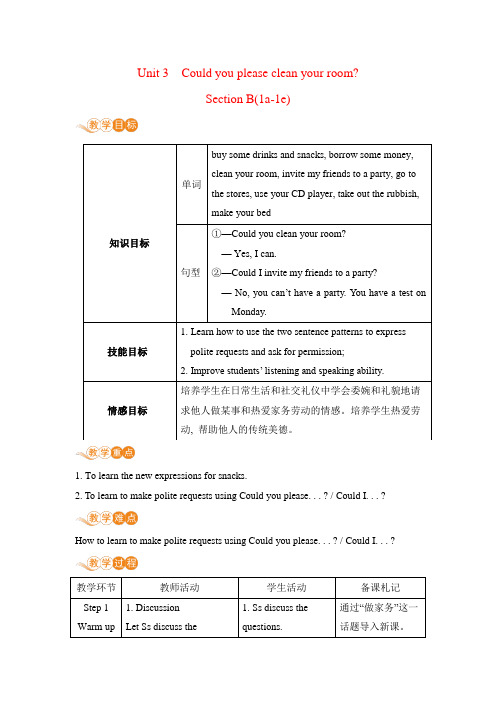
Ⅱ.根据句意及首字母完成单词。
1. Thanks a lot for invitingus to your birthday party.
2. You can borrowmy bike, but you must give it back to me this afternoon, because I’ll have to use it then.
2. Play the tape for the first time to get the main idea.
3. Check the answers.
4. Play it again for them to complete the sentences in 1d.
5. Listen to the tape, then check the answers.
____7. take out the rubbish
____8. make your bed
1. Ss discuss the questions.
2. Ss answer the questions.
3. Ss finish 1a.
通过“做家务”这一话题导入新课。
教学环节
教师活动
学生活动
备课札记
2. Ss show their dialogues.
通过口语结对活动,置学生于语言环境交际之中,调动学生的参与热情,将课堂教学成为一个师生共同学习创造的过程。
Step 3
Listening
(1c&1d)
1. Get the students have a quick look at the instructions of these two activities, so they can know how to do them.
人教版英语八年级下册Unit3_Section B (2a~2e)教案与反思

Section B第4课时(2a~2e)新竹高于旧竹枝,全凭老干为扶持。
出自郑燮的《新竹》前进学校史爱东类别学习重点重点单词stress, waste, provide, anyway, depend, develop, fairness, since, neighbor,ill, drop重点短语in order to, depend on, take care of, provide sth. for sb., as a result, doone’s part in, do not mind doing sth.重点句式1.They should spend their time on school work in order to get good grades.2.There is no need for them to do it now.3.The earlier kids learn to be independent, the better it is for their future.课前预习写一写1.压力stress2.浪费;垃圾waste3.提供;供应provide4.而且;加之anyway5.依靠;依赖depend6.发展develop7.公正性fairness 8.因为;既然 since9.邻居neighbor 10.有病;不舒服ill 11.落下;掉下drop译一译1.为了in order to2.依靠depend on3.照顾take care of4.为某人提供某物provide sth. for sb.5.结果as a result6.在……上尽一份力do one’s part in7.不介意做某事do not mind doing sth.背一背1.为了取得好成绩他们应该花时间在学习上。
They should spend their time on school work in order to get good grades.2.我认为做家务没那么难。
八年级英语下册Unit3教学设计教案

Teaching Plan forUnit 3 What were you doing when the UFO arrived?(Go For It)单元教材分析Unit 3以“What were you doing when the UFO arrived”为课题。
谈论如何使用过去进行时。
如何使用过去进行时是本单元的重难点。
通过观察图片,利用图片进行情景思维,学会讲故事,俩俩对话,角色扮演等形式和独立学习,合作交流,完成任务等来培养学生的综合语言运用能力,创新意识和实践能力。
总之,在本单元的教学全过程中,学生通过独立学习,角色扮演,实践体验,合作与交流的学习方式和任务型教学途径,通过掌握本单元的英语知识和技能,开发学生思维能力和发展个性,使语言学习的过程成为学生形成积极的情感态度,主动思维,大胆实践,使枯燥的语言变得丰富多彩,容易接受。
课时安排5/6课时第一课时:Section A (1a –1c)第二课时:Section A (2a—Grammar Focus)第三课时:SectionA (3a –4)第四课时: Section B 1—4a第五课时:(Self Check—Reading)教学计划Period 1 (1a –1c)Teaching key point:the usage of the past continuous tenseTeaching difficulties:How to use the past continuous tense in the adverb clause of time leaded by “when”and “while”.The Analysis of Teaching ProcessStep 1 - - - Organization1.Exchange greetings with the Ss.Duty report: It is between two students. They are having a dialogue.Enjoy a clip of film about the UFOStep 2 - - - Revision1.Show four animation pictures on the screenAfter showing the pictures, ask:----What is Peter’s mother doing? ---She is cooking.---What is Peter’s father doing? ---He is watching TV.---What is Peter doing? ---He is sleeping late.---What is Peter’s brother doing?. ---He is getting out of the shower教学设计说明复习进行时态2. Lead the students into the real situations:Ask one boy student: What are you doing now?The student may answer: I am listening to you.Ask the whole class: What is he doing?The whole class answer:He is listening to you.Repeat this with one girl student. Practice with the whole class, trying to revise the tense with different personal pronouns.教学设计说明同样复习进行时态,不同的是从图回到现实。
年春人教版最新八年级英语下册《Unit3 Could you please clean your room》教案(第4课时)

课时编号:授课时间:第周星期(2014年月日)第周星期(2014年月日)科目英语年级八年级班主备教师钟丽课题Unit 3Could you please clean yourroom? Section B 1 (1a-2e)授课教师教学目标1. 生词和短语care, feed, take care of, mine2. 重点句式Could you please do these things every day?Give him water and feed him.Don’t forget to clean his bed.3.能力目标Enable students to write an e-mail message asking for help.4.学能目标Help students learn how to write an e-mail message with the target language.教学重点Expressions used to make request.教学难点Expressions used to make request.教具教法Tape recorder, a projector, a computer and test papers.教学过程教学活动个人复备Step 1 Review单项选择。
1. -- Could you please take care of my dog?-- ______. I’m too busy.A. Yes, you canB. SureC. Sorry, I can’t2. -- Could you please ____ his bed?-- Certainly!A. makesB. makingC. make3. -- Could I use your car?-- ______.A. Sure, you canB. Sorry, you canC. Sure, I can4. Could you help _____?A. making the bedB. make the bedC. made the bedStep 2 DiscussionQ1: Do you help your parents do the chores at home?Q2: Do you ask your parents’ permission for?Q3: Do your parents ask you to do some things for them?Give some pictures and answer the following questions.What do your parents ask you to do?What do you ask your parents’ permission for?Step 3Finish 1a. What do teenagers ask their parents’permission for? What do parents ask their teenagers to do?Write parents or teenagers next to each phrase.1. buy some drinks and snacks2. borrow some money3. clean your room4. invite my friends to a party5. go to the store6. use your CD player7. take out the rubbish8. make your bedStep 4.Finish 1b. Use the phrases in 1a to make conversations.Step 5 Pair work1. Parents: Could you please…?Child: Yes, sure. / Sorry, I can’t. I have to ...2. Child: Could I …?Parents: Yes, you can. / No, you can’t. You ...Finish 1c. Listen to a conversation between Sandy and her mom. Check (√ ) the things in 1a that you hear.1. buy some drinks and snacks2. borrow some money3. clean your room4. invite my friends to a party5. go to the store6. use your CD player7. take out the rubbish8. make your bedFinish 1d. Listen again. Fill in the chart.What are they going to do?Sandy’s momSandy invite her friendsSandy and DaveStep 7 Finish 1e.You are having a party. Invite your partner to come your party and ask for help with these things. So, talk about the following things with your partner.e.g.A: Would like to come to my birthday party?B: Yes, I’d love to./Sorry, I can’t. I have to…A: Could you please take out the rubbish?B: Yes, sure./No, I can’t. I have to do…1. Warming up2a. Discuss the questions with your partner1) What do you often do to help your parents at home?2) Do you think kids should help out with chores at home?2. New wordsstress n. 精神压力; 心理负担waste n.浪费; 垃圾v. 浪费; 滥用depend v. 依靠; 依赖w W w . X k b 1.c O mdevelop v. 发展; 壮大fairness n.公正性; 合理性since conj. 因为; 既然prep., conj. & adv. 从……以后; 自……以来eighbor(= neighbour) n. 邻居drop v. 落下; 掉下3. Skimming2b. The Sunday Mail magazine invited parents to write about whether they think young people should do chores at home. Skim the following letters. Which one agrees and which one disagrees?了解阅读策略:Skimming 意为“快速掠过,从中提取最容易取得的精华”。
2024人教新目标八年级下册英语Unit 3Section A ( 1a- 2d) 导学案

Unit 3 Could you please clean your room?Section A ( 1a- 2d) 导学案学习目标:1.熟读本课单词: rubbish, fold, sweep-swept, floor, mess2. 词汇:do the dishes, take out the rubbish, fold the clothes, sweep the floor, make the bed,clean the living room, no problem, come over, clean up the kitchen, go out for dinner, go to the movies, stay out late, get a ride, work on, have to do, need to do, get something to drink, help out with, at least, finish doing,be enough for you, be back from shopping3. 句型:Could you please sweep the floor? Yes, sure.Could I watch TV? Yes, you can.Could you please help out with a few things?I think two hours of TV is enough for you.She won’t be happy if she sees this mess.课前预习:一、请在书本17,18和98, 99页划出学习目标里的词组以及句型。
三、单项选择。
1. For kids of this age, two hours of sitting in a classroom ______ too long.A. isB.areC. wasD.were2. He used to return home ______ once a year, but hasn't been back for almost three years now because of the hard job in a crayon factory.A. at leastB. at lastC. at mostD. at first3. —Could you take out the rubbish and do the dishes, Tony?—Sure. Mom will be mad if she sees this ______, I think.A. matterB. messC. troubleD. difficulty4. —Can you come to my birthday party tonight?—Yes, I'd love to. But I have to finish ______ my English homework first.A. doingB. to doC. doesD. do四、根据汉语意思完成英语句子,每空一词。
新人教版八年级英语下册教案Unit 3 Could you please clean your room Period 4教案
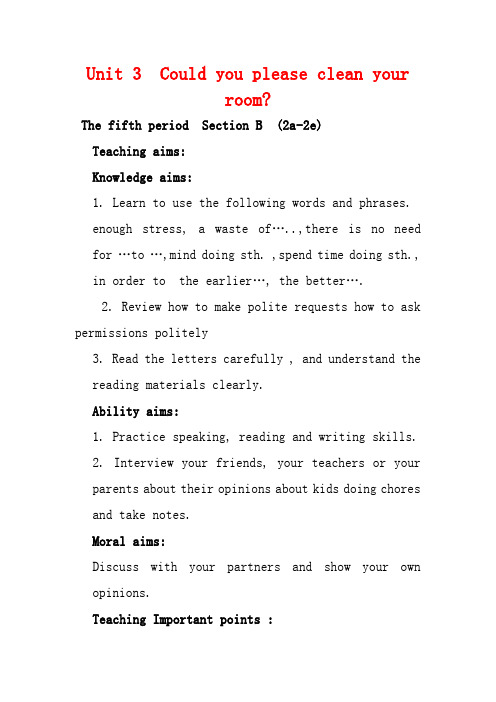
Unit 3 Could you please clean yourroom?The fifth period Section B (2a-2e)Teaching aims:Knowledge aims:1. Learn to use the following words and phrases.enough stress, a waste of…..,there is no need for …to …,mind doing sth. ,spend time doing sth., in order to the earlier…, the better….2. Review how to make polite requests how to ask permissions politely3. Read the letters carefully , and understand thereading materials clearly.Ability aims:1. Practice speaking, reading and writing skills.2. Interview your friends, your teachers or yourparents about their opinions about kids doing chores and take notes.Moral aims:Discuss with your partners and show your own opinions.Teaching Important points :Learn to use some important phrases and target languages.Teaching difficult points:1.Improve Ss’ ability to retell the letters.2.Interview your friends, your teachers or yourparents about their opinions about kids doing chores and take notes.3.Express your opinions about doing chores.Teaching procedures:Step 1 Warming-up1.Sing an English song.2.Free talk about doing chores. Could youplease ….?/Yes, sure. /….Step 2. Before reading.1.Watch a video about doing chores.2.Let Ss say out the chores in the video.eg: clean your room /help do the dishes / take the dog for a walk…3.Ask Ss to discuss the following questions witha partner.①What do you often do to help your parents at home?②Do you think kids should help out with chores athome?Students share their answers. Let Ss list the chores they can do.Step 3. While reading1.What’s “Skimming”?2. Fast reading. The Sunday Mail magazine invited parents to write about whether they think young people should do chores at home. Skim the following letters and answer the question:. Who doesn’t agree that students should do chores at home, Mr. Smith or Ms. Miller?3. Careful reading.(1).Read the first letter, and answer the following questions:Q1.What does Ms. Miller think the students should do at home?Q2.Why does Ms. Miller think there is no need for the students to do chores at home?Q3.Who does Ms. Miller think should provide a clean and comfortable home?(2).Read the second letter, and answer the following questions:Q1.Does Mr. Smith think children depend on their parents too much?Q2.How can doing chores help children in Mr. Smith’s opinion?Q3.What does Mr. Smith want us to learn from his neighbor’s story?(3).Let the Ss read the two letters, and fill in the chart in 2c.①.Read the examples, and guess the meanings of “pro”and “con”.②.According to Mr. Smith and Ms. Miller, what are the pros and cons about kidsdoing chores.(4).Students read the two letters and find out the difficult points.(5).Discuss and try to use the useful expressions in groups.a waste of…..there is no need for …to …mind doing sth.Spend time doing sth.in order tothe earlier…, the better….Step 4 After reading.1. Retell the two letters according to the key words and the chart.2. Discuss the question with a partner.Which letter do you agree with? Why?Step 5 Homework.Do you think children should do some chores at home? Make a survey in your class. Then write a report.The sixth period Section B (3a-self check )复习课Teaching aims:Knowledge aims:1. Review the following words and phrases.help with housework and chores at home, enough stress,a waste of…..,there is no need for …to …,minddoing sth. ,spend time doing sth., in order to the earlier…, the better…. It is important for sb. to do sth. develop children’s independence2. Review how to make polite requests how to ask permissions politelyAbility aims:1. Learn how to show your own opinions.2. Practice speaking, and writing skills.Moral aims:Discuss with your partners and show your own opinions.Teaching Important points :1. Learn how to show your own opinions.2. Practice speaking, and writing skills.Teaching difficult points:1.Improve Ss’ ability to write letters.2.Express your opinions about doing chores.Teaching procedures:Step 1 Warming-up1.Sing an English song.2.Free talk about doing chores or asking for parents’ permissions..Could you please ….?/Yes, sure. /…. /Could I ? /Step 2 Revision1.Have a dictation.2.Ask students to sum up the words and useful expressions in this unit.3.Ask students to complete Self check 1Check the answers:1. do the dishes2.clean your room/ the living room3.make the bed.4. fold the clothes.5. sweep the floor6. take out the rubbishStep 3 Practice1. Make conversations about doing chores or asking for parents’ permissions.eg : (1).A. Could you please sweep the floor / ?B. Yes, sure. Could you please do the dishes?A. No problem.(2).A. Could I invite my friends to a party / ?B. No, you can’t have a party. You have a teston Monday.2. Complete Self check 2.Are these polite requests or permissions? Write the numbers in the correct places in the chart.Then check the answers.3. Let the students use the questions in Self check2 to write a conversation.4. Ask several students to read out theirconversations.Step 4. Writing .1.Discuss the questions with a partner. And takenotes.Do you think children should do some chores at home?Why or why not?2.Encourage students to give their ideas.3. How to write a letter1. 信头:发信人地址和日期。
新人教版八年级下册初中英语全册教案(教学设计)
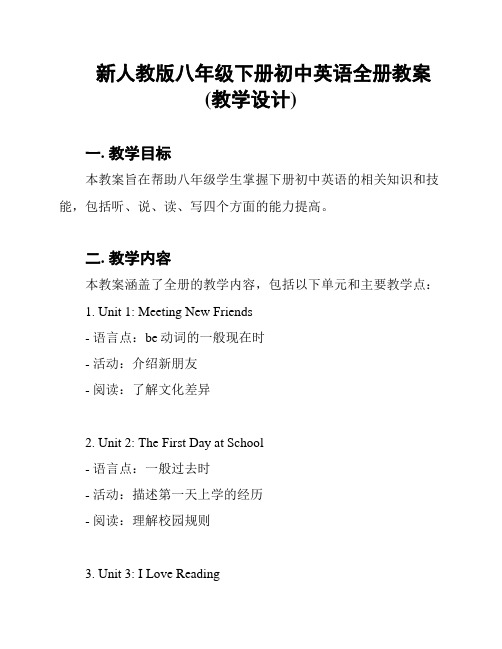
新人教版八年级下册初中英语全册教案(教学设计)一. 教学目标本教案旨在帮助八年级学生掌握下册初中英语的相关知识和技能,包括听、说、读、写四个方面的能力提高。
二. 教学内容本教案涵盖了全册的教学内容,包括以下单元和主要教学点:1. Unit 1: Meeting New Friends- 语言点:be动词的一般现在时- 活动:介绍新朋友- 阅读:了解文化差异2. Unit 2: The First Day at School- 语言点:一般过去时- 活动:描述第一天上学的经历- 阅读:理解校园规则3. Unit 3: I Love Reading- 语言点:情态动词can和must - 活动:介绍喜欢的书籍- 阅读:阅读理解4. Unit 4: My School Life- 语言点:形容词比较级和最高级- 活动:描述学校生活的不同方面- 阅读:了解不同的学校生活5. Unit 5: Our Future Jobs- 语言点:职业相关词汇- 活动:谈论未来的职业- 阅读:了解不同的职业6. Unit 6: Weather and Climate- 语言点:天气相关词汇和短语- 活动:讨论天气和气候- 阅读:了解不同地区的气候7. Unit 7: Enjoy Your Trip- 语言点:旅行相关词汇和短语- 活动:计划和描述旅行- 阅读:阅读旅行指南8. Unit 8: At the Farm- 语言点:动词的现在进行时- 活动:描述在农场的经历- 阅读:了解农场生活三. 教学方法本教案使用多种教学方法,包括但不限于:听力练、口语对话、阅读理解、小组讨论、写作练等。
教师将根据具体情况选择合适的教学方法进行教学。
四. 教学步骤1. 引入新课,激发学生兴趣。
2. 执行听力练以提高学生听力能力。
3. 进行口语对话练,帮助学生提高口语表达能力。
4. 进行阅读理解练,加深学生对课文的理解。
5. 进行小组讨论,让学生互相交流观点。
人教版八年级下册英语教案(全册)
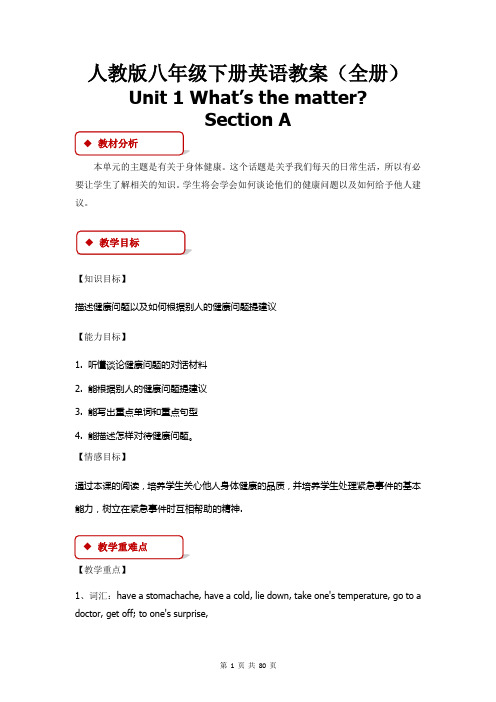
人教版八年级下册英语教案(全册)Unit 1 What’s the matter?Section A◆教材分析本单元的主题是有关于身体健康。
这个话题是关乎我们每天的日常生活,所以有必要让学生了解相关的知识。
学生将会学会如何谈论他们的健康问题以及如何给予他人建议。
◆教学目标【知识目标】描述健康问题以及如何根据别人的健康问题提建议【能力目标】1.听懂谈论健康问题的对话材料2.能根据别人的健康问题提建议3.能写出重点单词和重点句型4.能描述怎样对待健康问题。
【情感目标】通过本课的阅读,培养学生关心他人身体健康的品质,并培养学生处理紧急事件的基本能力,树立在紧急事件时互相帮助的精神.◆教学重难点◆【教学重点】1、词汇:have a stomachache, have a cold, lie down, take one's temperature, go to a doctor, get off; to one's surprise,2、句型:1. ——What's the matter?——I have a stomachache. You shouldn't eat so much next time.2 . ——What's the matter with Ben?——He hurt himself. He has a sore back.——He should lie down and rest.【教学难点】掌握情态动词should shouldn't.的用法;学习have的用法◆课前准备◆Multimedia, group work, cooperative discussion.◆教学过程Step1. Warm up1. Look at the picture and learn the parts of the body.2. New words and phrases.Step 2 Presentation1. 1aLook at the picture. Write the correct letter [a-m] for each part of the body. Then check the answers.2. 1bFirst, lead Ss to read the five names.Then look at the picture. Number the names 1-5.Finally, check the answers.3. 1cDivide two Ss into a pair to make conversations. Finally, invite several pairs to act out for the class.Step 3 Practice1. 2aTell Ss there are five conversations. In each conversation the person says what’s going on with them. Listen carefully and number the pictures.Play the tape. Then check the answers.2. 2bAsk Ss to listen to the recording again to match the problems with the advice.Play the recording again. Then check the answers.3. 2cAsk Ss to make conversations using the information in 2a and2b. Give them enough time to do this task. Later, invite several pairs to present their conversations to the class.Step 4 Consolidation1. 2dFirst, ask Ss to have a fast reading of the conversation to get the main idea.Then, lead Ss to read the conversation sentence by sentence, explain some language points.Finally, divide Ss into pairs to practice role-playing the conversation.2. 3aFirst, read the passage quickly and answer the question.Then, lead Ss to read the passage and analyse the key points.Finally, read together.3. 3bRead the passage again and check the things that happened in the story3cDiscuss the questions with a partner.4. Grammar focusFirst, lead Ss to read the sentences.Then, prompt Ss to analyse the use of model verb should.After that, explain the grammar together.5. 4aAsk Ss to fill in the blanks.Then , invite some Ss to present their answers.6. 4bAsk Ss to circle the best advice for these health problems, then add their own advice.After that, invite some Ss to present their advice.7. 4cOne student mimes a problem. The other students in your group guess the problem and give advice.Step 5 Language pointsStep 6 HomeworkMake a conversation about health problems and giving advice.Unit 1 What’s the matter?Section B◆教材分析本单元的主题是有关于身体健康。
八年级英语下册教案:Unit 3 Could you please clean your room
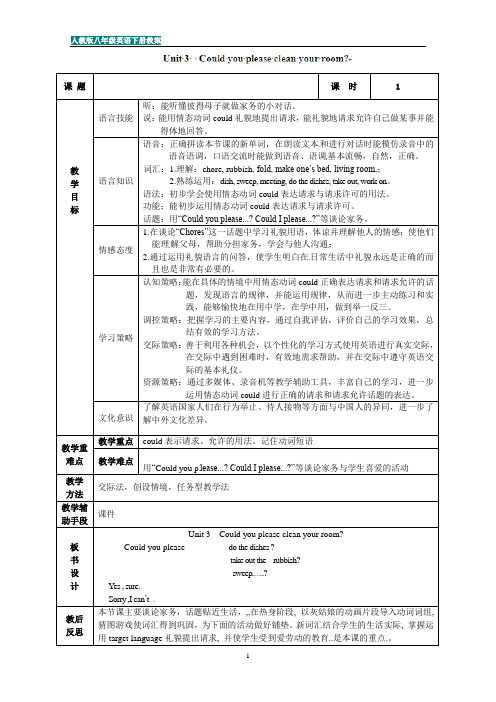
课题课时 1教学目标语言技能听:能听懂彼得母子就做家务的小对话。
说:能用情态动词could礼貌地提出请求,能礼貌地请求允许自己做某事并能得体地回答。
语言知识语音:正确拼读本节课的新单词,在朗读文本和进行对话时能模仿录音中的语音语调,口语交流时能做到语音、语调基本流畅,自然,正确。
词汇:1.理解:chore, rubbish, fold, make one’s bed, living room,;2.熟练运用:dish, sweep, meeting, do the dishes, take out, work on。
语法:初步学会使用情态动词could表达请求与请求许可的用法。
功能:能初步运用情态动词could表达请求与请求许可。
话题:用“Could you please...? Could I please...?”等谈论家务。
情感态度1.在谈论“Chores”这一话题中学习礼貌用语,体谅并理解他人的情感;使他们能理解父母,帮助分担家务,学会与他人沟通;2.通过运用礼貌语言的问答,使学生明白在日常生活中礼貌永远是正确的而且也是非常有必要的。
学习策略认知策略:能在具体的情境中用情态动词could正确表达请求和请求允许的话题,发现语言的规律,并能运用规律,从而进一步主动练习和实践,能够愉快地在用中学,在学中用,做到举一反三。
调控策略:把握学习的主要内容,通过自我评估,评价自己的学习效果,总结有效的学习方法。
交际策略:善于利用各种机会,以个性化的学习方式使用英语进行真实交际,在交际中遇到困难时,有效地需求帮助,并在交际中遵守英语交际的基本礼仪。
资源策略:通过多媒体、录音机等教学辅助工具,丰富自己的学习,进一步运用情态动词could进行正确的请求和请求允许话题的表达。
文化意识了解英语国家人们在行为举止、待人接物等方面与中国人的异同,进一步了解中外文化差异。
教学重难点教学重点could表示请求、允许的用法。
人教版新目标英语八年级下册教案全册(共50份)

人教版新目标英语八年级下册教案全册(共50份)Unit 3 Could you clean up your room?Section B (1a~1e)教学目标【知识与技能】1. 掌握本单元单词并正确使用以下常用表达法:buy some drinks and snacks, borrow some money, invite sb. to the party, make your bed…2. 能熟练掌握并使用下列重点句式:—Could you clean your room? —Yes, I can. —Could I invite my friends to a party? —No, you can’t have the party•Unit 3 Could you clean up your room?Section B (2a~3b)教学目标【知识与技能】1. 学习并掌握新词汇:chore; waste, provide, depend, drop等。
2. 能正确使用以下常用表达:a waste of time, provide sth. for sb., mind doing sth., take care of, depend on等。
3. 学会使用以下句型:they don’t have time… they should spend time on… it’s not enough to…, the+比较级,•Unit 3 Could you clean up your room?Section B (self check)教学目标【知识与技能】1. 学习并掌握新词汇:fair, unfair等。
2. 能正确使用以下常用表达:do chores; it’s fair/unfair for sb. to do sth.3. 注意正确搭配下列重点句式:do, clean, make, fold, sweep, take out4. 能熟练掌握并使用下列重点句式:I think/believe/agree that…; Can I/you…?【情感、态度与价值观】让学生学会征求他人的许可,并学会有礼貌地请•Unit 3 Could you please clean your room?Section A(1a~2d)教学目标【知识与技能】1. 掌握重点词汇rubbish,fold,sweep, floor, mess, take out the rubbish, fold the clothes, sweep the floor, all the time, make the bed, go out for dinner2. 掌握以下句型: 1.—Could you please sweep the floor? —Yes,sure.2.—Co•Unit 3 Could you please clean your room?Section A(3a~4c)教学目标【知识与技能】1. 学习掌握下列词汇:throw, neither, shirt, pass, borrow, lend, finger, hate, while, throw down, take the dog for a walk, be angry with, all the time, as soon as2. 句型:① For one week, she did not do any housework and neither did I.②—Could I b。
- 1、下载文档前请自行甄别文档内容的完整性,平台不提供额外的编辑、内容补充、找答案等附加服务。
- 2、"仅部分预览"的文档,不可在线预览部分如存在完整性等问题,可反馈申请退款(可完整预览的文档不适用该条件!)。
- 3、如文档侵犯您的权益,请联系客服反馈,我们会尽快为您处理(人工客服工作时间:9:00-18:30)。
新人教版八年级英语下册
Unit3 Could you please clean your room ?
Section A (1a—2c)教案
Teaching Aims :
Objects :
(1).Master the key words and phrases:
rubbish, take out the rubbish, fold, sweep, floor, mess.
(2).Target language :
—Could you please ...?
—Yes, sure. /All right. /No problem./Certainly/Of course.
Sorry, I can't. I have to do...
Sorry, I can't. I am doing...
—Could I ...?
—Yes, you can. /Sorry, you can’t.
2.Ability Objects :
(1).Learn to make a polite request and ask for permissions.
(2).Be able to understand the dialouges about making a polite request and asking for permissions.
Objects :
(1).Lead the students to know that it’s always right to be polite.
(2).Chores are part of fun in our life.
Teaching Key Points :
the new words and expressions.
to make a polite request and ask for permissions. Teaching Difficult Points :
Be able to make polite requests and ask for permissions. Teaching Aids :
A tape recorder, A projector.
Teaching Procedures :
Step 1 Lead-in
Greet the class ang listen a song“我爱我家”.
(Show some pictures about home in the projector.)
Ask some questions:
Eg: Do you like your family ? Do you like your father ? Do you like your mother ? Who is the busiest at your home? Why is your house clean?
Step 2 Presentation
and new words learning.
T: Your mothers are always busy, beacuse there are many chores at home. (Learn chore.) For example : do the dishes, take out the rubbish, fold the clothes, sweep the floor, make the bed, clean the living room.
Next teach the new words and phrases by using the pictures in the projector.
Then ask students “ what other chores do you know?”
game. What is she doing ?
work. Do you do these things at home? Write “Y” for “yes”and “N” for “no”.
key sentence introduction.
T: If you want Peter to do the dishes, what should you say ? “Peter, do the dishes.”“Can you do the dishes ?”“Could you please do the dishes ?”Which sentence is the most polite ?
Ss :Could you please do the dishes ?
T: Here, could is not the past tense. Using could is more polite.
—Could you please ...?
sure. /All right. /No problem./Certainly/Of
course.
Sorry, I can't. I have to do...
Sorry, I can't. I am doing...
Step 3 Teaching activities
Activity 1 Group work.
Welcome to my room ! But this is a dirty room. How to make the room clean? Division of labor within the fastest group is
the winner. The key sentence:
—Could you please ...?
sure. /All right. /No problem./Certainly/Of
course.
Sorry, I can't. I have to do...
Sorry, I can't. I am doing...
Activity 2 Listening.
the chores. Then listen to the tape, who will do these chores?Check (√)Peter’s mother or Peter.
again, finish the blanks.
play the tapescript. The boys PK the girls.
Activity 3 Interview .Who is the most able at home?
1. What chores do you do at home? How often do you do the chores? Work in group.
2. Then one student make a report to the class. “In my group,…. does the dishes every day,…We think … is the most able one in our group.”
the awards to the most able student in each group. Step 4 Summary
1. New vocabulary
do the dishes, sweep the floor, take out the trash, make
the bed, fold the clothes, clean the room
2. —Could you please ...?
—Yes, sure. /All right. /No problem./Certainly/Of course.
Sorry, I can't. I have to do...
Sorry, I can't. I am doing...
.
Step5 Homework
1.Conversation practice:
Make a conversation between you and your parent about doing the chores. Remember to use the sentences we learnt today.
2.Review and remember the new words.
【Blackboard Design】
Unit 3 Could you please clean your room?
Section A 1a—1c
Love our parents! Help do the chores!。
